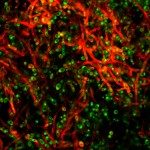Link to Pubmed [PMID] – 21818387
PLoS ONE 2011;6(7):e22770
BACKGROUND: Th17 cells play a major role in coordinating the host defence in oropharyngeal candidiasis. In this study we investigated the involvement of the Th17 response in an animal model of vulvovaginal candidiasis (VVC).
METHODS: To monitor the course of infection we exploited a new in vivo imaging technique.
RESULTS: i) The progression of VVC leads to a strong influx of neutrophils in the vagina soon after the challenge which persisted despite the resolution of infection; ii) IL-17, produced by vaginal cells, particularly CD4 T cells, was detected in the vaginal wash during the infection, reaching a maximum 14 days after the challenge; iii) The amount and kinetics of IL-23 in vaginal fluids were comparable to those in vaginal cells; iv) The inhibition of Th17 differentiation led to significant inhibition of IL-17 production with consequent exacerbation of infection; v) An increased production of βdefensin 2 was manifested in cells of infected mice. This production was strongly reduced when Th17 differentiation was inhibited and was increased by rIL-17 treatment.
CONCLUSIONS: These results imply that IL-17 and Th17, along with innate antimicrobial factors, have a role in the immune response to vaginal candidiasis.
